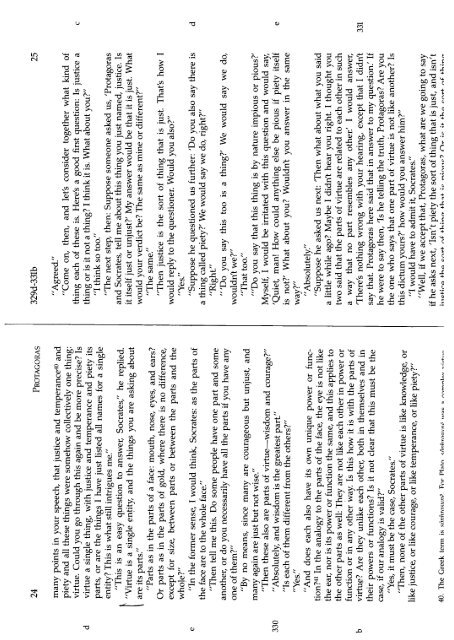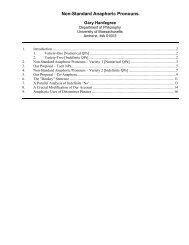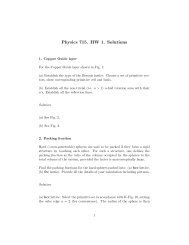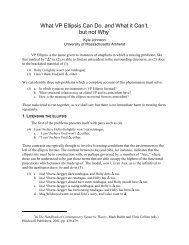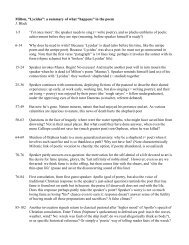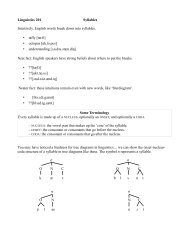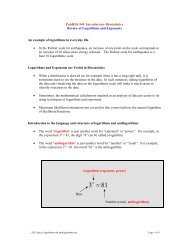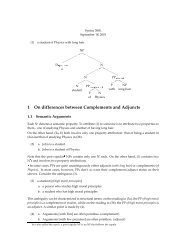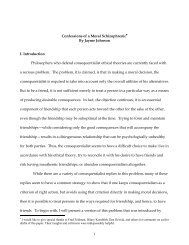Protagoras (PDF)
Protagoras (PDF)
Protagoras (PDF)
Create successful ePaper yourself
Turn your PDF publications into a flip-book with our unique Google optimized e-Paper software.
24 PRoTAGoIs 329d-331b 25<br />
4° and<br />
many points in your speech, that justice and temperance<br />
piety and all these things were somehow collectively one thing:<br />
virtue. Could you go through this again and be more precise? Is<br />
d virtue a single thing, with justice and temperance and piety its<br />
parts, or are the things I have just listed all names for a single<br />
entity? This is what still intrigues me.”<br />
“This is an easy question to answer, Socrates,” he replied.<br />
“Virtue is a single entity, and the things you are asking about<br />
are its parts.”<br />
‘Parts as in the parts of a face: mouth, nose, eyes, and ears?<br />
Or parts as in the parts of gold, where there is no difference,<br />
except for size, between parts or between the parts and the<br />
whole?”<br />
4’ In the analogy to the parts of the face, the eye is not like<br />
e “In the former sense, I would think, Socrates: as the parts of<br />
the face are to the whole face.”<br />
“Then tell me this. Do some people have one part and some<br />
anothei or do you necessarily have all the parts if you have any<br />
one of them?”<br />
“By no means, since many are courageous but unjust, and<br />
many again are just but not wise.”<br />
“Then these also are parts of virtue—wisdom and courage?”<br />
330 “Absolutely, and wisdom is the greatest part.”<br />
“Is each of them different from the others?”<br />
“Yes:’<br />
“And does each also have its own unique power or func<br />
tion?<br />
the eat nor is its power or function the same, and this applies to<br />
the other parts as well: They are not like each other in power or<br />
function or in any other way. Is this how it is with the parts of<br />
b virtue? Are they unlike each othet both in themselves and in<br />
their powers or functions? Is it not clear that this must be the<br />
case, if our analogy is valid?”<br />
“Yes, it must be the case, Socrates.”<br />
“Then, none of the other parts of virtue is like knowledge, or<br />
like justice, or like courage, or like temperance, or like piety?”<br />
40. The Greek term is .cñnhrncun, lcir Pb,fn<br />
“Agreed.”<br />
“Come on, then, and let’s consider together what kind of<br />
thing each of these is. Here’s a good first question: Is justice a<br />
thing or is it not a thing? I think it is. What about you?”<br />
“I think so too.”<br />
“The next step, then: Suppose someone asked us, ‘<strong>Protagoras</strong><br />
and Socrates, tell me about this thing you just named, justice. Is<br />
it itself just or unjust?’ My answer would be that it is just. What<br />
would your verdict be? The same as mine or different?”<br />
“The same.”<br />
“Then justice is the sort of thing that is just. That’s how I<br />
would reply to the questioner. Would you also?”<br />
“Yes.”<br />
“Suppose he questioned us further: ‘Do you also say there is<br />
a thing called piety?’ We would say we do, right?”<br />
“Right.”<br />
“Do you say this too is a thing?’ We would say we do,<br />
wouldn’t we?”<br />
“That too.”<br />
“Do you say that this thing is by nature impious or pious?’<br />
Myself, I would be irritated with this question and would say,<br />
‘Quiet, man! How could anything else be pious if piety itself<br />
is not?’ What about you? Wouldn’t you answer in the same<br />
way?”<br />
“Absolutely.”<br />
“Suppose he asked us next: ‘Then what about what you said<br />
a little while ago? Maybe I didn’t hear you right. I thought you<br />
two said that the parts of virtue are related to each other in such<br />
a way that no part resembles any other.’ I would answer,<br />
‘There’s nothing wrong with your hearing, except that I didn’t<br />
say that. <strong>Protagoras</strong> here said that in answer to my question.’ If<br />
he were to say then, ‘Is he telling the truth, <strong>Protagoras</strong>? Are you<br />
the one who says that one part of virtue is not like another? Is<br />
this dictum yours?’ how would you answer him?”<br />
“I would have to admit it, Socrates.”<br />
“Well, if we accept that, <strong>Protagoras</strong>, what are we going to say<br />
if he asks next, ‘Isn’t piety the sort of thing that is just, and isn’t<br />
d<br />
e<br />
331


